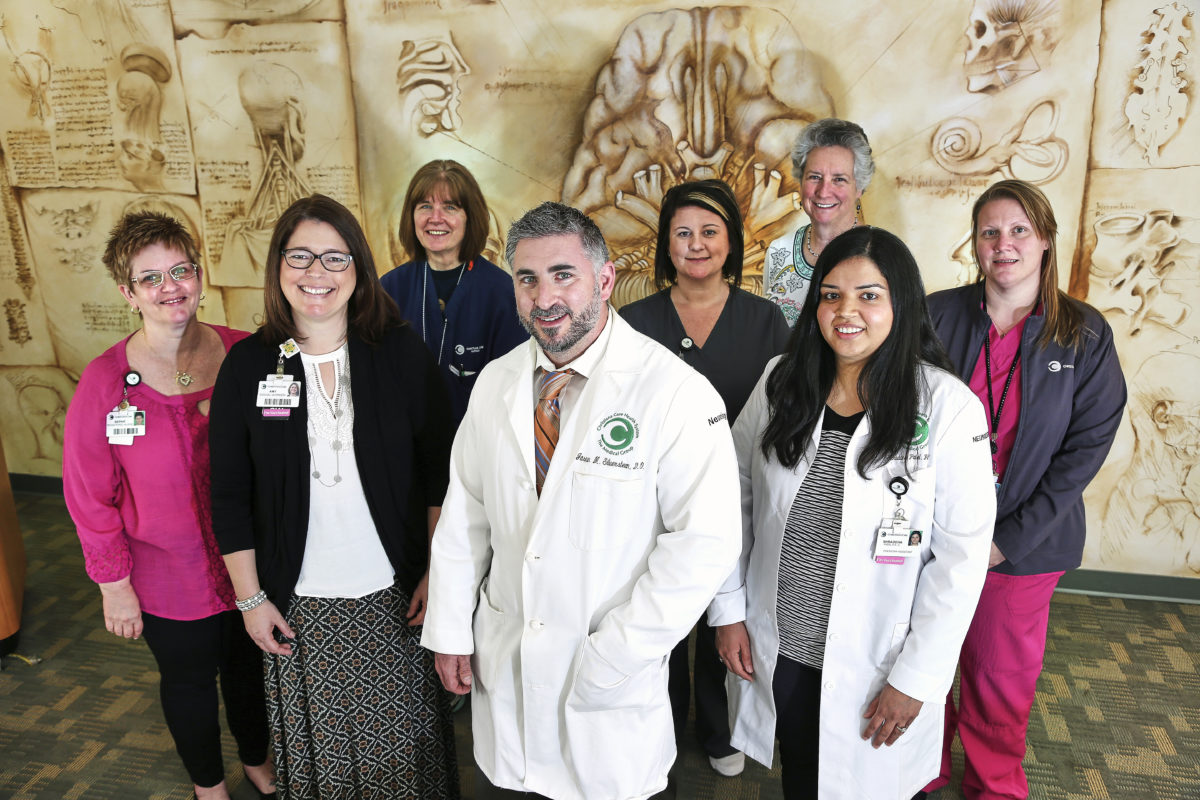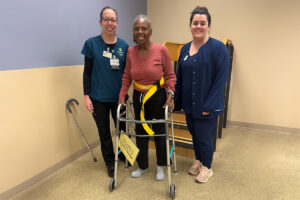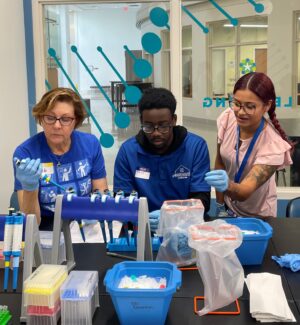For integration of medical, psychological and rehabilitative care to meet the complex needs of patients with multiple sclerosis, Christiana Care has earned a first-in-Delaware recognition that puts it among the top tier of MS programs nationwide.
Christiana Care has been designated a Center for Comprehensive MS Care by the National Multiple Sclerosis Society, which recognizes providers that offer a multidisciplinary model of care. Patients at these centers have access to coordinated services that take patients’ medical and non-medical needs into account.
This milestone was achieved in large part due to the work of Jason M. Silversteen, D.O., who joined Christiana Care in 2010 as a neurology specialist and neurology education coordinator with the Internal Medicine Residency Program.
“We wanted to build a model that comprehensively cares for this unique population of patients,” Dr. Silversteen said. “The focus was to address all of the medical needs and, just as importantly, the non-medical needs that these patients have.”
People with multiple sclerosis experience a wide array of symptoms, both physical and mental, as their immune system wears away at the protective sheath around neurons. The disease is only rarely fatal but can cause debilitating symptoms that strike without warning.
For Shareba B. Waters of Middletown, multiple sclerosis symptoms include fatigue and a painful, severe stiffness that freezes an entire leg. Pain management treatment and physical therapy at Christiana Care have helped Waters pursue her goals, including a doctorate in behavioral health.
She noticed a difference in her care during her first visit with Dr. Silversteen in 2011.
“He was compassionate and concerned,” said Waters, 44. “It was such a breath of fresh air — I had never been with a doctor like him before.”
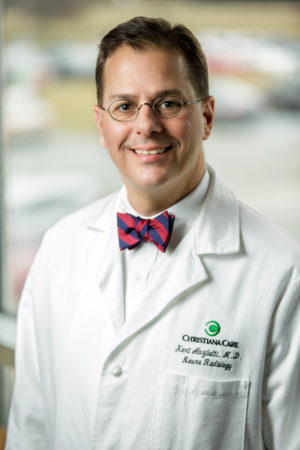
Kert Anzilotti, M.D., MBA, physician leader in the Neurosciences Service Line and chair of the Radiology Department, said “when you bring on someone like Dr. Silversteen, with specialty training and an interest in the field, then you can take the care model to the next level.”
The community has benefited from Dr. Silversteen’s impact.
Kevin Moffitt, president of the Greater Delaware Valley Chapter of the National Multiple Sclerosis Society, said Dr. Silversteen, who serves on the chapter’s health care advisory committee, is well known in the region for how much he cares about patients.
“He takes his time, and he’s incredibly knowledgeable,” Moffitt said. “He’s one of the leaders in this field in our area.”
Dr. Silversteen built a team iteratively; a physician assistant was added within a few years of his arrival, followed by a nurse to manage medication and another to coordinate research. Because depression is a common symptom of multiple sclerosis, a behavioral health nurse is embedded within the program to provide in-house counseling and referrals to psychiatrists.
Dr. Silversteen created relationships with community providers, as in the case of a private physical therapy practice downstairs from his office. The practice worked with Dr. Silversteen to certify one of its therapists in MS care. A nutritionist also works with his patients once a month.
Aggregating providers and services is a key strategy to care for his 1,300 or so patients, who comprise perhaps half of all multiple sclerosis patients statewide. His overall goal: To help them live full lives while reducing hospitalizations and infection rates.
About a year ago, the team added a critical piece to that puzzle. Amy Benton is a part-time social worker whose position is funded by the MS society.
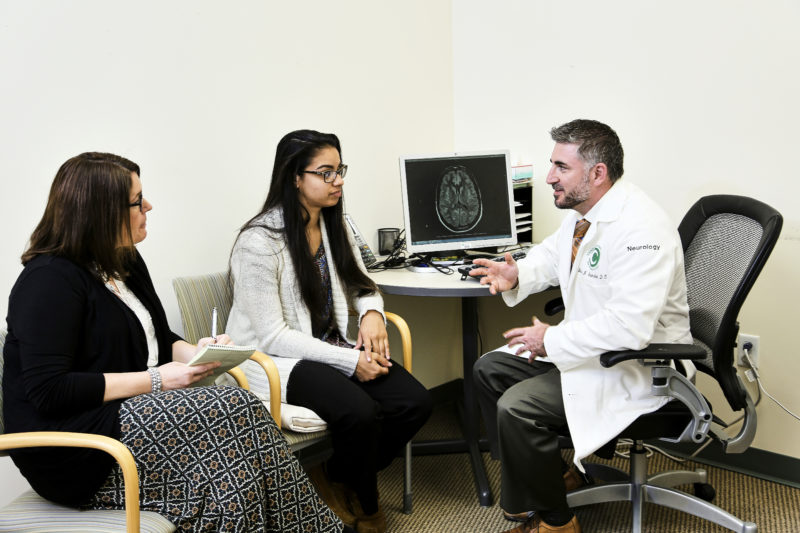
Like many social workers, Benton has many roles. She assists patients with insurance issues and helps them navigate the U.S. Social Security Administration. Benton, who has worked for Christiana Care for almost 15 years, also counsels patients and supports their caregivers.
“She’s crucial to help with the non-medical needs of patients ranging from disability issues to transportation to insurance,” Dr. Silversteen said.
For example, cognitive impairment is a symptom experienced by about half of multiple sclerosis victims. Especially when paired with fatigue, felt by four in five of those with multiple sclerosis, problems with reasoning and decision-making can put complicated tasks, such as applying for disability insurance under the federal government, out of reach.
“It is beyond frustrating,” he said of such difficulties, “and that is where one of the real values of the social worker has been.”
And while applying for disability benefits isn’t a medical issue, it’s in service of the “ultimate goal of improving a patient’s quality of life,” Dr. Silversteen said.
Meeting the complete needs of patients with multiple sclerosis
Combining visits is time-saving for all patients but is especially important for those with a variety of medical needs.
“There are many patients who are extremely symptomatic and very complex,” Dr. Silversteen said. “Ideally, you want multiple providers to see them in the same day. All these providers see the patient, give their assessment and input and we get together as a team to review the case, talk about a care plan and enact it.”
Dr. Silversteen’s multidisciplinary team took years to build. And building a one-stop shop is a goal toward which he and the team continue to move.
The program recently added a bladder-scanning imaging device that uses ultrasound waves. People with multiple sclerosis sometimes suffer from urine-retention issues, which can pose an infection risk. Now, instead of scheduling another appointment, the test can be performed the same day.
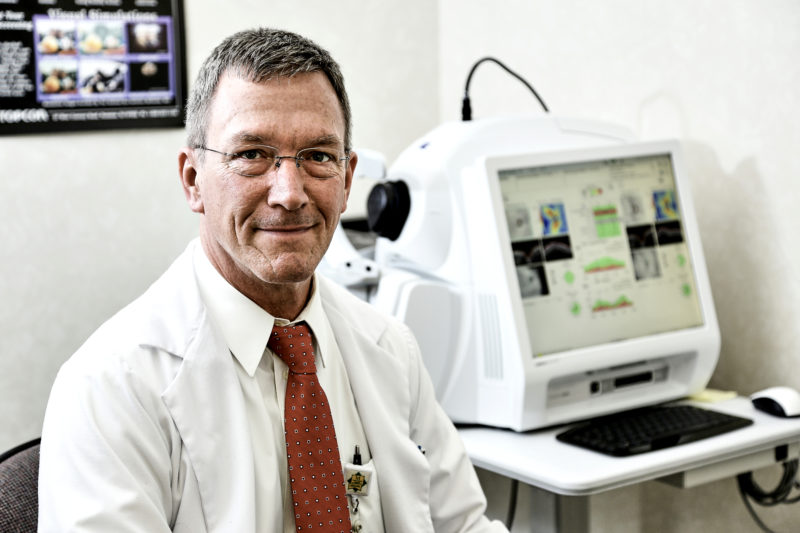
The program also partnered with John M. Otto, O.D., director of Christiana Care Eye Care, to provide patients convenient access to a state-of-the-art imaging tool called optical coherence tomography, or OCT. The OCT scans the retina and optic nerve to search for evidence of damage from MS not just in the eye, but also in other areas such as the brain. It’s a non-invasive, cost-effective, relatively inexpensive and research-backed diagnostic tool — a rarity in multiple sclerosis care.
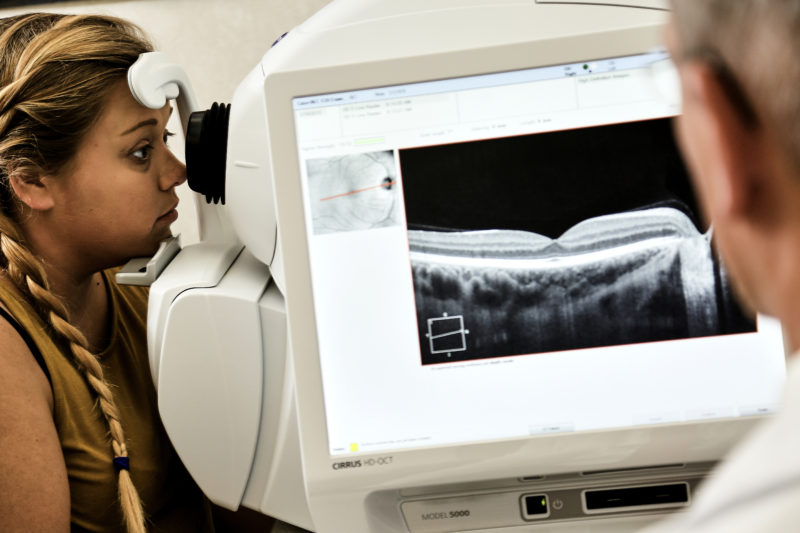
Convenience is in service to the greater goal: Helping patients keep living the life they want.
Waters, the Middletown patient, doesn’t let her disease keep her from volunteer work at church, where she serves as the secretary and organizes a multiple sclerosis club. And her care helps her keep up with her 9-year-old twin daughters.
Waters was diagnosed with multiple sclerosis in 2007, when she lived in Philadelphia, after experiencing vision problems — it was as if a gray film were descending across her field of vision, day by day. Her symptoms intensified after a 2009 fall and broken ankle. In 2011, the year she moved to Delaware, she started using a cane. She transitioned to a motorized scooter in 2014.
She now goes to physical therapy twice a week at Christiana Care’s Preventive Medicine & Rehabilitation Institute.
“Because I don’t have as much mobility, we’re trying to keep my legs moving as much as possible,” she said. “I try to walk every time I’m there.”
In 2015, Dr. Silversteen referred her to a physician who implanted a pump that administers a muscle relaxant to combat her stiffness. Waters also recently underwent bariatric surgery.
Ultimately, helping her family has been Waters’ biggest motivation.
“For me, my driving forces have always been my girls.”
Specialized care benefits patients
A general neurologist can treat multiple sclerosis, which is the most common cause of disability in the United States among young people.
However, specialization breeds a familiarity with the nuances of multiple sclerosis. For example, while Dr. Silversteen is not a pain doctor, he’s had plenty of experience with multiple sclerosis patients for whom pain is the primary problem.
Noting that Delaware has passed legislation that allows patients 18 and older with “certain serious or debilitating conditions” to use medicinal marijuana, Dr. Silversteen said that he’s “a big advocate for medical cannabis because, No. 1, it’s safer than opiate medications and, No. 2, I’ve seen the success with using medical cannabis.”
This degree of specialization also allows Christiana Care to participate in drug trials, giving patients access to experimental medication. The program is participating in about a half-dozen such trials at any time.
“Our research nurse is crucial to make sure they run smoothly,” Dr. Silversteen said.
This is an exciting time for MS research. More than a dozen medications are now available to treat multiple sclerosis. The first drug to treat progressive multiple sclerosis, the form of the disease in which symptoms worsen steadily, was approved in March by the U.S. Food and Drug Administration.
The biggest drivers toward the adoption of a comprehensive care model are the patients, Moffitt said. Now, patients who search for the highest-quality providers on the advocacy group’s website will discover Christiana Care’s Center for Comprehensive MS Care.
“More and more patients are demanding it,” Dr. Silversteen said. There are two other Centers for Comprehensive MS Care in the Philadelphia region, but fewer in other parts of the country. The biggest barrier to providers is cost, Moffitt said.
“It’s not something you make a lot of money from. We even have trouble getting neurologists to specialize in MS,” he said.
These headwinds make finding providers willing to adopt a comprehensive care model all the more important.
“It’s the expertise and passion of Dr. Silversteen — but the support of the institution itself, Christiana Care, is equally important,” Moffitt said. “We want to give as many people as possible access to the highest level of care because the needs of people living with MS are so complex. When you can have the medical, psychological and rehab services delivered in one place, that makes such a huge difference.”
